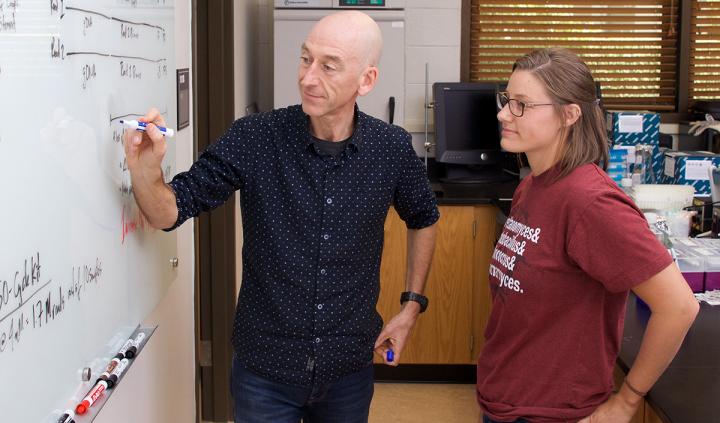
Credit: Clemson College of Science/Pete Martin
CLEMSON, South Carolina — Although mostly preventable, tooth decay is one of the most common chronic diseases in children worldwide, particularly in developing countries. If left untreated, cavities can be painful and may negatively affect a young child’s overall health, development and quality of life.
Clemson University College of Science researchers recently conducted a study that may someday lead to better cavity prevention measures and treatments. Specifically, biological sciences assistant professor Vincent Richards’ group examined the oral mycobiome, including all the fungi that might live there.
“This work provides valuable insight into the oral mycobiome and the role fungi play in the mouth as it relates to caries,” said Richards. “If we understand that better then researchers can develop better cavity prevention measures. For example, perhaps they can put beneficial fungal species into a pro-biotic treatment.”
For years, the dental community has known that tooth decay occurs when the good and bad bacteria in our mouth become imbalanced and forms a biofilm (aka plaque). The biofilm absorbs the sugars we eat and the bacteria catabolize those sugars, turning them into acid, which decalcifies the teeth and causes cavities.
Thanks to advances in genome sequencing technology, scientists recently discovered that there is also a high diversity of fungi in the mouth, albeit in far fewer numbers than bacteria. However, little was known about the fungi’s role in cavity formation and caries disease progression.
“The microbiome is a community-based thing and it’s very complex,” said biological sciences graduate student Lauren O’Connell, the lead author of the study. “Because fungi are present in the tooth biofilm, they’re capable of utilizing these same sugars [as bacteria] and can produce acid, but we don’t fully understand their role.”
In the study, O’Connell sequenced the DNA from plaque samples of 33 children with varying stages of tooth health, including healthy teeth with no cavities; teeth with enamel lesions, which are indicative of an early-stage cavity; and teeth with dentin lesions, which indicate an advanced-stage cavity requiring either a filling or extraction.
She also examined the condition of the patients’ mouths, including a mouth with no cavities or lesions; a mouth with some teeth that have enamel lesions; and a mouth that has some teeth with enamel and dentin lesions.
“By looking at two variables–tooth and mouth health–we are taking a site-specific approach, which enables us to categorize each plaque sample six ways, or along a continuum,” said Richards. “This is important because we have found that the bacterial microbiome from a healthy tooth in a diseased mouth is more similar to the microbiome of a diseased tooth. That microbiome has shifted its profile to more of a diseased state.”
“We wanted to see how the microbiome community changed as the disease progressed,” explained O’Connell. “There’s only been one other study that looked at the fungi in relation to cavities, but they examined only healthy teeth and severely diseased teeth.”
The research team identified 139 species of fungus that live in human dental plaque, and of those, nine were strongly associated with dental health–in other words they could be contributing to keeping teeth healthy.
The fungi associated with healthy teeth may be producing a compound called xylitol, which has been shown to inhibit the growth of the Streptococcus mutans bacteria that is known to cause cavities. Xylitol is an ingredient in sugarless gum.
“It’s possible that the nine fungi are promoting health by creating xylitol and other advanced microbial compounds,” said O’Connell. “But we have to do further functional testing to figure out if that is actually what is happening.”
The team also discovered interesting things about fungi associated with disease. For example, they learned that Candida dubliniensis was strongly associated with late-stage cavities and was found in abundance as tooth decay progressed, which could make it a potential indicator species of early childhood caries.
According to O’Connell, a second finding related to possible disease-causing fungi was that Candida albicans, the fungus that causes yeast infections, was found in both healthy and diseased plaque samples, which makes its role in dental caries unclear.
###
This research was published on March 18, 2020, in Applied and Environmental Microbiology as a spotlight article. The full title of the paper is “Site-specific profiling of the dental mycobiome reveals strong taxonomic shifts during progression of early childhood caries.”
This study was a collaborative effort with the University of Florida Dental School, which provided the plaque samples for sequencing and analysis. Clemson University genetics senior Ryan Santos and recent graduate Garrett Springer (BS, biological sciences and computer science 2019) completed sample processing.
Funding for this research was provided, in part, by Clemson’s Biological Sciences Graduate Professional Development Grants in Aid of Research.
Media Contact
Laura Schmitt
[email protected]
Original Source
https:/
Related Journal Article
http://dx.




